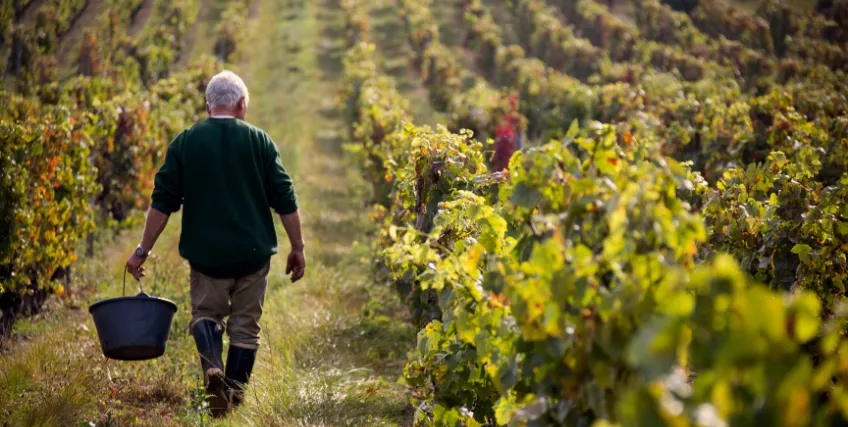Vineyard Loans vs. Agricultural Loans: What’s the Difference
Sep 23, 2025 | Last Updated on: Sep 24, 2025

Being a vineyard business owner in the U.S., you know how much work goes into your vineyard. These include long days, changing seasons, repairing equipment, and careful planning for the future. But at some point, every vineyard business owner in the wine industry faces the same decision: what should I choose between vineyard loans vs. agricultural loans for my business.
This question often confuses many vineyard owners across the whole American town. For you, both loan options vineyard loans and agricultural loans may sound similar, yet they serve different purposes. Vineyard loans focus more on the wine industry and winemaking. While agricultural loans support broader farm loan needs, from crops to livestock.
So, if you’re unsure which financing solution between vineyard loans vs. agricultural loans matches your business, you are at the right place. By the end of this guide, you will know which loan option is suitable for your vineyard business, what lenders expect from borrowers like you, and how to choose the loan program that fits your specific needs.
What Are Vineyard Loans?
Vineyard loans are not the same as general business loans. These are financing options that are suited for vineyards and wineries that have unique business requirements.
After all, planting vines, waiting for them to mature, and managing winemaking equipment is nothing like running a regular storefront. This is why there are specific loan programs like vineyard loans that are tailored to your specific needs, whether you’re focused on vineyard land, real estate, or working capital.
Here’s how financing for vineyards can help you:
- Between vineyard loans vs. agricultural loans, you can use vineyard loans to upgrade winery equipment used in winemaking and storage.
- You can use winery financing options to cover operating expenses during off-seasons.
- Funds from vineyard loans can also be used to expand vineyard acreage or plant new grape varieties.
- Also, if you want to purchase real estate in expensive cities like California or wine-producing regions, vineyard loans can be a good choice among vineyard loans vs. agricultural loans.
Hence, with the right vineyard loan option, you can also gain flexibility with working capital support. As a result, this helps you cover short-term costs while keeping your cash flow stable.
For instance, a business owner who runs a mid-size winery in a busy town in America wants to install new fermentation tanks, but don’t have enough capital. So, how will he install it? An owner can consider vineyard loans for installing new fermentation tanks. With this financing option, you can get the loan amount you need, with repayment schedules being designed around your vineyard’s income cycles.
How Do Vineyard Loans Work?
When choosing between vineyard loans vs. agricultural loans, you will notice that lenders treat vineyard loans differently from general agricultural business loans.
Here’s what to expect as a borrower when seeking vineyard financing:
- Application: You apply for the vineyard loan application, submit financial records, vineyard details, and a business plan for your winery.
- Loan Amount: The loan amount depends on your vineyard’s value, real estate, and projected revenue.
- Collateral: For vineyard financing, lenders often require collateral such as vineyard property, winery equipment, or agricultural land.
- Repayment Terms: Your repayment schedule typically aligns with harvest seasons, so that your cash flow remains manageable.
- Interest Rates: Interest rates vary by lender, but vineyard-specific loan programs often account for the wine industry’s cycles.
What Are Agricultural Loans?
Agricultural loans are financing solutions that sound broad. These loans cover general farming and agricultural land needs. Hence, these funding options fit better if you operate multiple crops or livestock alongside your vineyard.
Here’s how you can use agricultural business loans:
- Between vineyard loans vs. agricultural loans, you can use agricultural business loans to purchase large farm equipment for crops or livestock.
- These loans can be used to acquire agricultural real estate to expand your business.
- You can secure working capital for everyday operating expenses with agricultural financing options.
- Also, you can access short-term financing for seasonal cash flow gaps by using funds from these loans.
Therefore, various agricultural lenders, including USDA loans, design programs for a wide variety of agricultural businesses. If you see your farm more than just vineyard, agricultural business loans may serve you better.
For example, a farmer who grows grapes but also raises cattle can use agricultural loan between vineyard loans vs. agricultural loans to purchase irrigation systems that serve both vineyard and pasture.
How Do Agricultural Loans Work?
Now we can say that between vineyard loans vs. agricultural loans, vineyard loans can be a part of agricultural financing as agricultural loans stretch further.
Here’s how agricultural financing works:
- Application: You can apply for agricultural loans by providing details for farm financials, agricultural land, and your operational plans.
- Loan Amount: Lenders then calculate the loan amount based on your farm size, assets, and repayment capacity.
- Collateral: These loans often require collateral that can be agricultural land, machinery, or other business assets.
- Repayment Terms: Repayment schedules usually match farming cycles, giving borrowers flexibility with cash flow.
- Loan Options: Agricultural business loans may include USDA loan programs, lines of credit, or standard business loans.
Pro Tip: If you need both financing for vineyards and support for row crops, agricultural business loans can be the right choice. These loans give you flexibility under one financing solution.
Vineyard Loans vs. Agricultural Loans: Key Differences
For you, vineyard loans may sound like just another type of farm loan. But vineyard loans are specialized, while agricultural loans are general and stretch further.
So, here are the important differences that will help you choose between vineyard loans vs. agricultural loans.
| Feature | Vineyard Loans | Agricultural Loans |
|---|---|---|
| Primary Focus | Vineyards, wineries, and winemaking | Broad farming operations and agricultural land |
| Loan Purpose | Expansion, winery loans, financing for vineyards | Crops, livestock, equipment, and agricultural real estate |
| Loan Program | Vineyard loans, winery financing | USDA loans, farm loan programs, agricultural business loans |
| Collateral | Vineyard real estate, winery assets | Agricultural land, equipment, general real estate |
| Repayment Schedules | Structured for vineyard harvest cycles and cash flow | Designed for broader agricultural cycles |
| Fit For | Business owners in the wine industry | Borrowers running multiple agricultural operations |
Factors You Should Consider as a Vineyard Owner
Before deciding on any of the loan option between vineyard loans vs. agricultural loans, you need to think about these factors:
- Specific Needs: Do you need financing for vineyards alone, or do you require broader agricultural business loans?
- Loan Options: Always compare vineyard loans, winery loans, and agricultural loans side by side.
- Interest Rates: Ask lenders about current interest rates and repayment terms.
- Collateral: Be ready to use vineyard real estate, winery equipment, or agricultural land as collateral.
- Down Payment: Some loan programs require a down payment upfront, depending on the lender.
- Cash Flow: Make sure repayment schedules do not create pressure on your short-term working capital.
The Bottom Line: As a business owner, if your focus is on winemaking only, then vineyard loans will align more with your specific needs. But if you see your farm expanding beyond wine, then agricultural loans may be more flexible among vineyard loans vs. agricultural loans.
How to Choose the Right Loan Option
As a vineyard business owner, you know what the strengths of your vineyard are. So, when choosing between vineyard loans vs. agricultural loans, you need to match those strengths with the right financing solution.
Here’s how you can approach it:
- Ask yourself if your loan is strictly for winemaking or vineyard expansion.
- Compare loan amounts, repayment terms, and interest rates across lenders.
- Consider a line of credit if you want quick access to short-term working capital.
- Explore USDA loans, which many agricultural lenders offer as part of their loan program.
- Talk to lenders who understand the wine industry and winery financing and then choose between vineyard loans vs. agricultural loans.
The Bottom Line
You now understand the difference between vineyard loans vs. agricultural loans. Vineyard loans meet the specific needs of vineyards, wineries, and winemaking. While agricultural loans cover larger farming operations and agricultural land investments.
If your focus is solely on financing for vineyards, vineyard loans or winery financing may be a good match. But, if your agricultural business goes beyond wine, agricultural loans may offer more flexibility.
Hence, the clarity is yours now. You know how repayment terms, loan options, and lenders differ between vineyard loans vs. agricultural business loans. So, your next step is to speak with an agricultural lender or winery loan specialist who understands your business. With the right financing solution, you can strengthen your cash flow, support your short-term needs, and invest in your vineyard’s long-term success.
FAQs About Vineyard Loans vs. Agricultural Loans
Are vineyard loans really different from agricultural loans?
You could say vineyard loans are a branch of agricultural loans. Agricultural loans cover almost every type of farm, while vineyard loans focus only on grape growing and winemaking. So, if you run a vineyard or winery, vineyard loans may feel more in tune with your reality.
Which one is easier to get: vineyard loans vs. agricultural loans?
Choosing between vineyard loans vs. agricultural loans depends on your situation. Agricultural loans, especially USDA programs, are well known and often more available. Whereas vineyard loans might feel more specific, but they usually align better with the seasonal cash flow and costs you face as a vineyard owner.
Can agricultural loans cover winery financing too?
Agricultural loans might cover winery financing, but only to a point. Agricultural loans support land, equipment, or general farm needs. So, if you’re investing in winemaking facilities or bottling, vineyard loans or winery loans may provide a better match.
Do USDA loans apply to vineyards?
USDA loans fall under agricultural loan programs, and some of them work for vineyard owners. They may help with land, infrastructure, or operating expenses. But if your focus is more on winemaking, vineyard loans could fit closer to your needs. You might even find that combining USDA support for land with vineyard loans for equipment gives you a balanced financing solution.
Do vineyard loans always require a higher down payment?
Some vineyard loans tied to land or real estate may ask for more upfront. But agricultural loans can also require significant down payments. Hence, it usually comes down to the loan amount, the lender, and how you plan to use the funds.
Frequent searches leading to this page
Term Loans are made by Itria Ventures LLC or Cross River Bank, Member FDIC. This is not a deposit product. California residents: Itria Ventures LLC is licensed by the Department of Financial Protection and Innovation. Loans are made or arranged pursuant to California Financing Law License # 60DBO-35839




